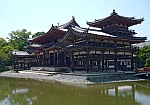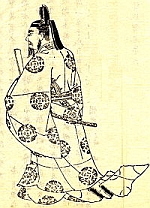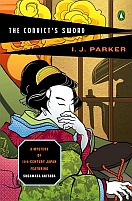| MYSTERY |
| HISTORICAL
FICTION |
|

|
|

Byodoin Phoenix Hall,
built in the 11th century during the Heian period of Japan.
|

Drawing of Fujiwara Michinaga, by
Kikuchi Yōsai.
|
|
|
|
BOOK
ILLUMINATIONS
From Merrimon Book Reviews
HOME
ROMANCE
FICTION SUSPENSE & THRILLERS
MYSTERY
AUTHORS REVIEWER
PROFILES
|
The Convict's Sword
 by I.J. Parker
by I.J. Parker
 11th century Japanese Mystery
11th century Japanese Mystery
Lord Sugawara Akitada,
senior secretary in the Minstry of Justice, cannot forget the promise
to his friend Haseo. Condemned to die for a crime he swears he
did not commit, Haeso has left few clues behind to help Akitada's hunt
for answers. Although his sword remains, Akitada must first
uncover the very details of the charged crime, including the
victim. All records have been wiped away just as the family name
of convicts are erased. Meanwhile, Akitada's retainer, Toro,
investigates the the murder of Tomoe, a blind singer. As the two
seek to uncover the truth, smallpox disrupts the city's normal patterns
as residents flee and others seek to protect themselves.
Set in 11th century Japan, THE CONVICT'S SWORD gives an authentic look
into the history of the period without sacrificing the mystery to the
historical details. THE CONVICT'S SWORD is a delight for mystery
lovers like myself who crave challenging complex mystery puzzles over
the more linear mysteries peppered with a few red herrings.
Indeed, the historical details and the mystery itself combine in equal
measure to make THE CONVICT'S SWORD a thrilling adventure for fans of
both genres. The mysterious lack of details sets the stage for an
exciting mystery while Akitada's reasoning and examination of clues
creates a mystery that leads him deeper and deeper into the setting and
characters related to the mysteries. Alongside the main
storyline, I.J. Parker creates subplots, such as the events and
troubled relationships in his workplace and family, that create a rich
depth of characterization. The characters are never static but
their ongoing relationships change and deepen throughout the story as
the events challenge them in new ways.
Sixth in the Sugawara Akitada mysteries, not including the short
stories, THE CONVICT'S SWORD works as a stand alone for newcomers to
the series, like myself, although in finishing this novel, I am eager
to explore I.J. Parker's earlier mysteries and anxiously await any
future releases as well. The mystery is not bogged down with a
retelling of past cases nor does a reader feel a lack of information
coming to the series fresh thanks to the richness of the author's
characterization. Likewise, a reader need not be a scholar of
Japanese history to enjoy this mystery. While the novel is packed
full of historical detail, the author's style is not antiquated nor do
the characters feel remote and detached. The historical details
are never superfluous but rather are exquitely integrated into the
characterization and hunt for clues. I.J. PARKER gives the
reader a look into the Heian age and the dynamics within the city and
its residents as the case takes both Akitada and Toma to look for clues
in various groups of residents. THE CONVICT'S SWORD has a
wonderful mixture of action, a more intellectual fine analysis of
records, and the rich relationships within society and between
individuals.
Publisher: Penguin
(Non-Classics) (July 28, 2009)
A Sugawara Akitada 11th century Japan Mystery
Reviewed by Merrimon,
Merrimon Book Reviews
Courtesy of Amazon Vine

|
|
|